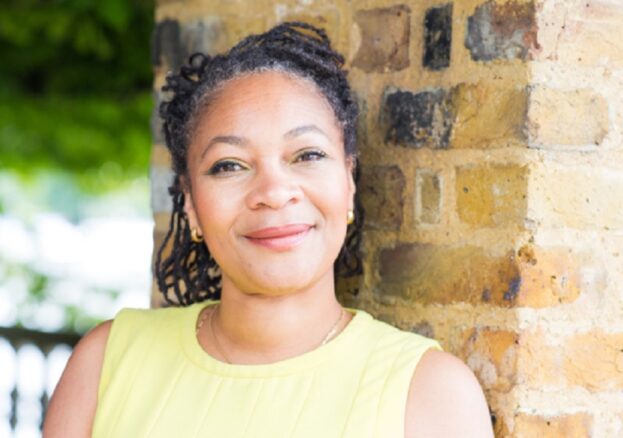
Growing up in a mainly white area of Birmingham in the 1970s, a child of 2nd generation immigrants with my kinky curly hair, brown skin, gap-tooth smile, and skinny legs, I couldn’t hide my difference. My mother was Jamaican born and spoke the Queen’s English, but I tried to adopt a ‘Brummie’ accent and a zany line of chatter to cover my shyness. Like many only children, I inhabited a vivid imaginary world and loved reading.
Discovering the stories of black girls, and women in books by Maya Angelou, Toni Morrison, Alice Walker and Audre Lorde – who’d experienced heartbreak, hatred, and isolation in fantastic and harrowing ways, but who were still sassy and resilient stirred the writing muse in me.
I achieved my first writing acclaim in 1985, winning the Black Penmanship Awards competition organised by Len Garrison with my essay entitled “How to Improve the image of Black people in the White Media.” The following year I got second place with an essay entitled “What makes a Black person Black?”
My passion for writing remained during my corporate years as a copywriter and working in Public Relations, but it was the process of losing my mother and grandfather plus the diagnosis of my son’s autism and ADHD as well as meeting my husband-to-be all in the same year, that got my writing juices flowing again.
For me, writing is therapy and the poetry just flowed for my ‘Songs of My Soul.’ It’s very personal, and strongly reflects a turning point in my life, when my role in the family was changing. Songs of My Soul is a diverse debut poetry collection which draws on contemporary and classic influences. In it I use a variety of poetic styles to make observations about humanity: love, loss, parenthood, lust, grief, it also includes a special tribute poem to Maya Angelou. I split the book into three parts: Discovery, Holy Fire, and Resurrection to ease the reader through their own spiritual journey and an appreciation of the poems.
The Windrush poem is one of my personal favourites in the Collection. It’s a tribute to the ancestors, as many of that generation are passing on. My aim here was to capture some of the emotions of the islanders as they started out on a journey when they didn’t know how it would end. When you hear the stories now about the Windrush migration the sense of disappointment and broken dreams is tangible. I wanted to record the fact that many of the people on their passage to the ‘mother country’ literally travelled with the clothes on their back. They thought their future was cast iron and had no reason to mistrust the officials and politicians who were born into privilege either in the colonies or in England.
When I perform The Windrush I invite people to join me in singing the Lord Kitchener song, “London is the place for me”. It still gives me goose-bumps!
I self-published this book, and even painted the image on the front cover. The book was sold in the Diverse bookshop, and the Black Cultural Archives, London and at other black cultural festivals.
My second book S.E.N.D. in the Clowns is a non-fiction guide for parents and families raising autistic/adhd children, which takes them through the whole process from assessment to diagnosis and how an autism, ADHD diagnosis might impact on their child’s learning at primary & secondary school.
S.E.N.D. in the Clowns also covers some of the injustice that black boys experience at school, whether they are diagnosed with any condition or not. It provides ideas and suggestions to improve the experience of black boys in schools and how to manage their exclusion, get an Educational and Health Care Plan and work effectively with the school. The information will help parents feel empowered and be better prepared as an advocate for their child.
This sort of information and finding appropriate ways to meet our communities’ needs, whether the needs of our children or the needs of our elders is important. 2020 has made this crystal clear and urgent. It is up to those in the community to put pen to paper or use technology to record the situation and the solutions. As we do so we must I believe document the ordinary as well as the extraordinary. As we move through this time of trauma and awakening that is so much a part of Black History Month , it feels at times as if we do not have many options. We have, and part of this is to tell diverse stories about Black history and culture. If we don’t the status quo will remain unchallenged, and where’s the progress and excitement in that?
For me Black History isn’t solely about the big-ticket names that are referred to all the time by the media and others. It’s just as much about the nameless and forgotten, about the unsung heroes, and those who had dreams of writing books and plays. As we take up writing as a means of record, as a means of sharing potential solutions to the many things that block potential and hamper achievement of Black people remember you are doing what has been done in the UK by many of our ancestors in the difficult days of enslavement.
A copy of S.E.N.D. in the Clowns can be ordered from Amazon, or email: hello@happyinschoolproject.com
Biography:
Suzy Rowland is an author, Autism & ADHD Specialist & Trainer, Cognitive Behavioural Therapist and poet.
